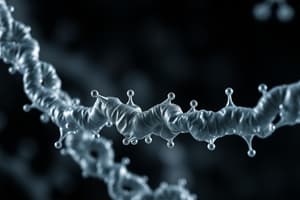Podcast
Questions and Answers
What is the monomer of proteins?
What is the monomer of proteins?
- Amino acids (correct)
- Nucleotide
- Monosaccharide
- Fatty acids
Which of the following is the monomer of carbohydrates?
Which of the following is the monomer of carbohydrates?
- Monosaccharide (correct)
- Fatty acids
- Nucleotide
- Amino acids
What is the monomer of lipids?
What is the monomer of lipids?
- Fatty acids (correct)
- Amino acids
- Nucleotide
- Monosaccharide
Which of the following is NOT a function of proteins?
Which of the following is NOT a function of proteins?
Which of the following statements about carbohydrates is correct?
Which of the following statements about carbohydrates is correct?
What happens when the electronegativity difference of combining atoms in a molecule is 0.4?
What happens when the electronegativity difference of combining atoms in a molecule is 0.4?
Which biomolecule serves as the primary source of energy?
Which biomolecule serves as the primary source of energy?
Which monomer is NOT correctly matched with its biomolecule?
Which monomer is NOT correctly matched with its biomolecule?
What is the main function of proteins in living organisms?
What is the main function of proteins in living organisms?
Why do marathon runners consume a carbohydrate-rich meal before a race?
Why do marathon runners consume a carbohydrate-rich meal before a race?
Which biomolecule is known for its role in insulation and energy storage?
Which biomolecule is known for its role in insulation and energy storage?
In chemical kinetics, what term describes the speed at which a chemical reaction takes place?
In chemical kinetics, what term describes the speed at which a chemical reaction takes place?
Which of the following is a function of biological macromolecules?
Which of the following is a function of biological macromolecules?
Which of the following is a common misconception about proteins as monomers?
Which of the following is a common misconception about proteins as monomers?
What is a primary function of carbohydrates as monomers?
What is a primary function of carbohydrates as monomers?
Which of the following is not a function of lipids as monomers?
Which of the following is not a function of lipids as monomers?
In the context of biomolecules, what does the term 'monomer' refer to?
In the context of biomolecules, what does the term 'monomer' refer to?
How do biological macromolecules contribute to the structural integrity of cells?
How do biological macromolecules contribute to the structural integrity of cells?
Study Notes
Biomolecules
- Carbohydrates: except Chitin, primary source of energy, composed of monosaccharides, example: starch
- Proteins: built and repair body tissues, composed of amino acids, example: hemoglobin
- Lipids: insulation and energy storage, composed of fatty acids and glycerol, example: cholesterol
- Nucleic acid: transfer of genetic information, composed of nucleotides, example: DNA
Chemical Kinetics
- Study of the rate of chemical reactions
- Reaction rate: the speed at which a chemical reaction takes place
- Reaction mechanism: a sequence of reaction steps that show how reactants are converted to products
- Factors affecting the rate of reactions
Polarity of Molecules
- Identifying polar or nonpolar molecules based on electronegativity difference
- Nonpolar molecules: electronegativity difference ≤ 0.5
- Polar molecules: electronegativity difference > 0.5
- Covalent bond: formed through sharing of electrons, exists between non-metals
Biological Macromolecules
- Proteins: monomer is amino acids
- Carbohydrates: monomer is monosaccharide
- Lipids: monomer is fatty acids and glycerol
Cosmic Origin of Elements
- Big Bang Theory: most accepted theory about the formation of the universe
- Nucleosynthesis: process of creating new atomic nuclei from pre-existing nuclei
- Big Bang Nucleosynthesis: responsible for the formation of light elements such as Hydrogen and Helium
- Nuclear fusion: process of forming heavier elements, example: Carbon is formed when three Helium atoms are fused
Studying That Suits You
Use AI to generate personalized quizzes and flashcards to suit your learning preferences.
Description
Test your knowledge on biomolecules such as carbohydrates, proteins, lipids, and nucleic acids. Identify examples of biomolecules, their monomers, functions, and distinguishing characteristics.




